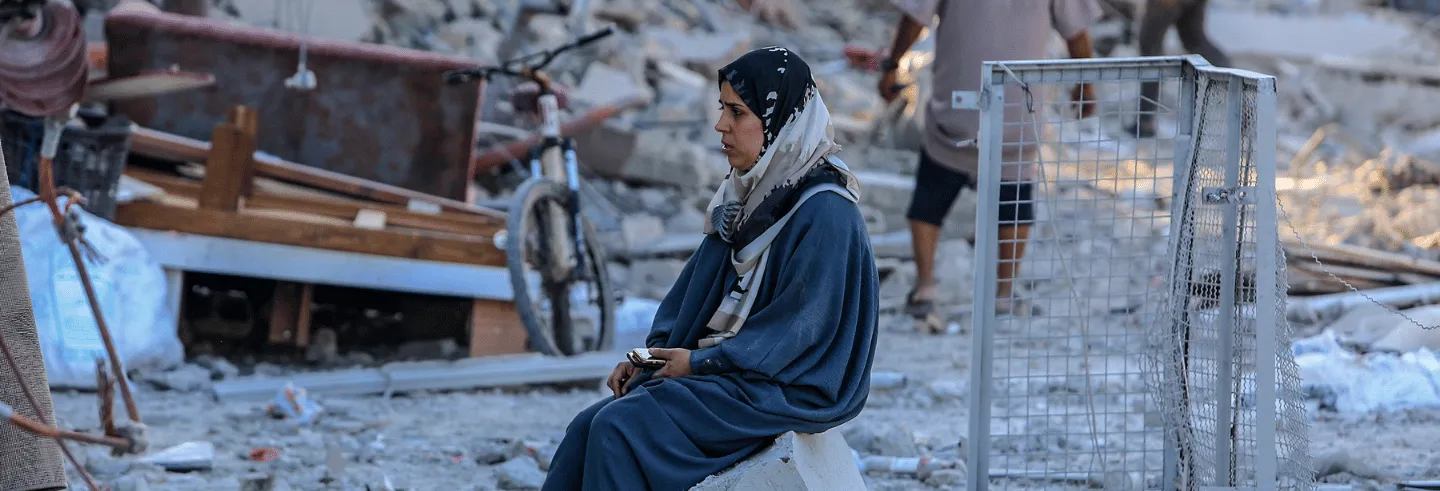As bombs rained down and entire neighbourhoods around her were pulverised, Shayma Abualatta found the only way to cope with the trauma of Gaza's 15-month-long war was to make sure she did all she could to get an education.
Now the 21-year-old, who is studying computer science and computer engineering, wants to use what she learned to help rebuild a land where the most basic lifelines have been severed and where everyone needs everything.
"I want to stay in my country, to stay where I am, to stay with my relatives and the people I love," she said.
As a fragile ceasefire takes hold in Gaza, Palestinians are beginning to think cautiously about rebuilding - a Herculean task when the entire 2.3 million population is homeless with many displaced multiple times.
During the conflict, Abualatta said the only way she could exercise some control over her life was to keep studying. But for the first three months of the war, she could not even bring herself to open her laptop. The first time she did, she cried.
"The race is on to save children facing hunger and disease as the shadow of famine looms..."
"I felt like it was such a blessing to have the opportunity to achieve something," she said in a phone interview from central Gaza, where she had fled from air strikes in the north.
The Israeli military has laid to waste to much of Gaza in its campaign to eliminate Hamas in retaliation for the militant group's Oct. 7, 2023 attack on Israel.
Gaza health authorities say at least 47,000 people have been killed in the conflict, with the rubble likely holding the remains of thousands more.
As well as freeing 33 of the 98 Israeli and foreign hostages still held by Hamas, the ceasefire deal requires Israel to allow 600 truckloads of aid into Gaza every day for six weeks.
"We need the border crossings to open without restrictions," Abualatta said. "We need everything."
Electricity is one of her main concerns. Every day she walks from the tent where she now lives to a local charging point where she can get online. With peace, she hopes more solar panels can be brought into the territory.
"We just need to clear the rubble and set up tents over them," she said. "We will start off the with tents and develop them slowly."
That might prove easier said than done.
Scale of crisis "unimaginable"
The scale of the humanitarian crisis is "almost unimaginable", Alexandra Saieh of charity Save the Children, told Context, "multiple pressing crises are unfolding, and they are deeply interconnected".
The United Nations says removing 42 million tonnes of rubble in Gaza could take more than a decade and cost $1.2 billion.
Save the Children said it would prioritise sending food, water and medicine for children.
"The race is on to save children facing hunger and disease as the shadow of famine looms," Saieh said.
The United Nations says removing 42 million tonnes of rubble in Gaza could take more than a decade and cost $1.2 billion.
Fuel to power water desalination plants is also essential, said Vincent Stehli, head of operations at aid group Action Against Hunger. But repairing water networks would require items such as metal pipes that Israel currently bans entering Gaza.
Stehli said aid groups "cannot wait 10 or 15 years," until the rubble is cleared. "Reconstruction has to happen. Recovery has to happen to some of the key installations," he said.
Abualatta agrees. When her Gaza-based university suspended online classes, she sought out University of the People (UoPeople), a tuition-free, completely online university, and began taking computer science courses.
She expects to graduate next year.
UoPeople has raised $300,000 to pay for scholarships for students in Gaza, Shai Reshef, the university's president, told Context.
"If we get more money, we will get even more of them, as many as we have money for," he said.
But he said students could not wait till their schools and universities were rebuilt to get an education.
"What do you do with the kids? With the students? Teach them online," Reshef said.
Nazih Osseiran is the Middle East Correspondent at the Thomson Reuters Foundation.
This article first appeared on Context, powered by the Thomson Reuters Foundation.









